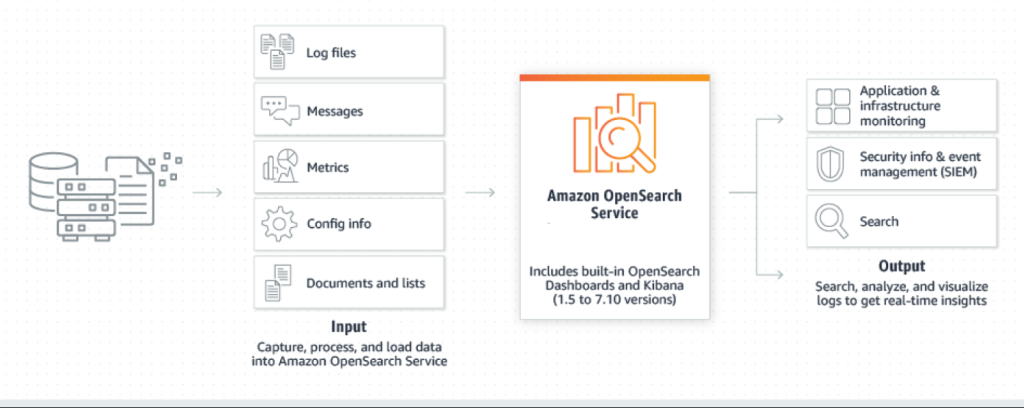OpenSearch is an open-source search and analytics suite, derived from Elasticsearch 7.10.2 and Kibana 7.10.2. It’s designed to provide distributed search, analytics, and visualization capabilities across large volumes of data in near real-time. OpenSearch was created following changes in licensing for Elasticsearch and Kibana by Elastic, which prompted AWS (Amazon Web Services) to fork these projects to maintain an open-source version under the Apache 2.0 license. It comprises two main components:
- OpenSearch: The core search and analytics engine that offers scalable search, document indexing, and deep analytics capabilities.
- OpenSearch Dashboards: A visualization tool in the suite that allows for creating and sharing dashboards to visualize and explore data stored in OpenSearch.
OpenSearch provides a highly scalable system for providing fast access and response to large volumes of data with an integrated visualization tool, OpenSearch Dashboards, that makes it easy for users to explore their data. OpenSearch is powered by the Apache Lucene search library, and it supports a number of search and analytics capabilities such as k-nearest neighbors (KNN) search, SQL, Anomaly Detection, Machine Learning Commons, Trace Analytics, full-text search, and more.
Use Cases of OpenSearch
OpenSearch is versatile and caters to a wide range of applications, including:
- Log Analytics: Aggregating, monitoring, and analyzing system and application logs to understand behavior, troubleshoot issues, and monitor infrastructure.
- Full-Text Search: Providing powerful search capabilities across websites, applications, and documents with support for complex queries and search operations.
- Real-Time Analytics: Analyzing and visualizing data in real time to gain insights into operations, performance, and trends.
- Security Information and Event Management (SIEM): Collecting, normalizing, and analyzing security event data to detect and respond to threats.
- Application Performance Monitoring (APM): Monitoring application performance and tracking anomalies or issues affecting user experience.
- Geo-Spatial Search: Enabling search capabilities based on geographical location and distances, useful for location-based services and applications.
Key Use Cases of OpenSearch:
- Real-time Application Monitoring: Gain insights into application performance, identify errors or bottlenecks quickly, and optimize resource utilization.
- Log Analytics: Efficiently analyze and explore log data to understand application behavior, troubleshoot issues, and ensure system health.
- Website Search: Implement robust and scalable full-text search capabilities for your website, delivering a seamless user experience.
- Security and Threat Detection: Analyze security logs to detect anomalies, investigate potential threats, and enhance overall security posture.
- Business Intelligence and Analytics: Uncover valuable insights from various data sources through powerful search and visualization tools to inform critical business decisions.
Similar Tools to OpenSearch
Several tools and platforms offer functionality similar to OpenSearch, catering to various aspects of search and analytics:
- Elasticsearch: The original search and analytics engine from which OpenSearch was forked. It remains a popular choice for distributed search and analytics, especially when paired with Kibana for visualization.
- Apache Solr: An open-source search platform built on Apache Lucene, providing robust full-text search, faceted search, real-time indexing, and more.
- Splunk: A commercial product that specializes in searching, monitoring, and analyzing machine-generated big data via a web-style interface.
- Apache Lucene: A high-performance, full-featured text search engine library written entirely in Java. It’s a technology suitable for nearly any application that requires full-text search, especially cross-platform.
- Graylog: An open-source log management tool that focuses on log aggregation, search, and analysis. It’s often used for monitoring and troubleshooting IT infrastructure issues.
OpenSearch vs. Elasticsearch
| Feature | OpenSearch | Elasticsearch |
|---|---|---|
| License | Apache License 2.0 (Open Source) | Elastic License (custom, with paid options) |
| Governance | Community-driven, vendor-neutral | Elastic company-driven |
| Cost | Free and open-source | Free tier with paid features and support |
| Feature Parity | Aims for feature parity with Elasticsearch | May have additional features not in OpenSearch |
| Performance | Generally performs slightly slower than Elasticsearch | May be faster in some scenarios |
| Security Features | Full suite of security features included by default | Basic security in free tier, advanced features paid |
| Integrations | May require adjustments for existing Elasticsearch integrations | More integrations readily available due to longer history |
| Community Support | Growing community, active development | Larger, established community |
How OpenSearch works?


Choosing the Right Tool:
The best tool for you depends on your specific needs and priorities. Consider factors like:
- Scale: How much data do you need to handle? Do you anticipate significant growth?
- Community: How important is a strong community for support and development?
- Licensing: Are you comfortable with a permissive open-source license like Apache 2.0 (OpenSearch) or do you have specific licensing requirements?
- Feature Set: Does the tool offer the necessary features for your use case (e.g., security analytics, machine learning integrations)?
- Ease of Use: How important is a user-friendly interface and deployment process?
Reference
https://aws.amazon.com/what-is/opensearch
https://github.com/opensearch-project/OpenSearch
I’m a DevOps/SRE/DevSecOps/Cloud Expert passionate about sharing knowledge and experiences. I am working at Cotocus. I blog tech insights at DevOps School, travel stories at Holiday Landmark, stock market tips at Stocks Mantra, health and fitness guidance at My Medic Plus, product reviews at I reviewed , and SEO strategies at Wizbrand.
Please find my social handles as below;
Rajesh Kumar Personal Website
Rajesh Kumar at YOUTUBE
Rajesh Kumar at INSTAGRAM
Rajesh Kumar at X
Rajesh Kumar at FACEBOOK
Rajesh Kumar at LINKEDIN
Rajesh Kumar at PINTEREST
Rajesh Kumar at QUORA
Rajesh Kumar at WIZBRAND

 Starting: 1st of Every Month
Starting: 1st of Every Month  +91 8409492687
+91 8409492687  Contact@DevOpsSchool.com
Contact@DevOpsSchool.com
